| |
|
Eastern China
Ancestor Ceremony Commemorates Lao Tzu |
|
Ceremony held at Tianjing Palace
Commemorates Lao Tzu one of China's most Celebrated Philosophers
Lao Tzu lived during the 'Spring and Autumn Period' (770-476 BC) |
|
Lao Tzu's Birthplace - Guoyang
County of Bozhou City
East China's Anhui Province - March 26, 2017 |
|
Dressed in Traditional Han Clothing
Hundreds of Taoists 'Pay Respect to Lao Tzu' the Founder of
Taoism |
|
This Ceremony also marks the start
of the 'Seminar on Lao Tzu and Taoism Culture'
Attended by more than 1,000 Scholars and Taoists from both China
and Abroad |
|
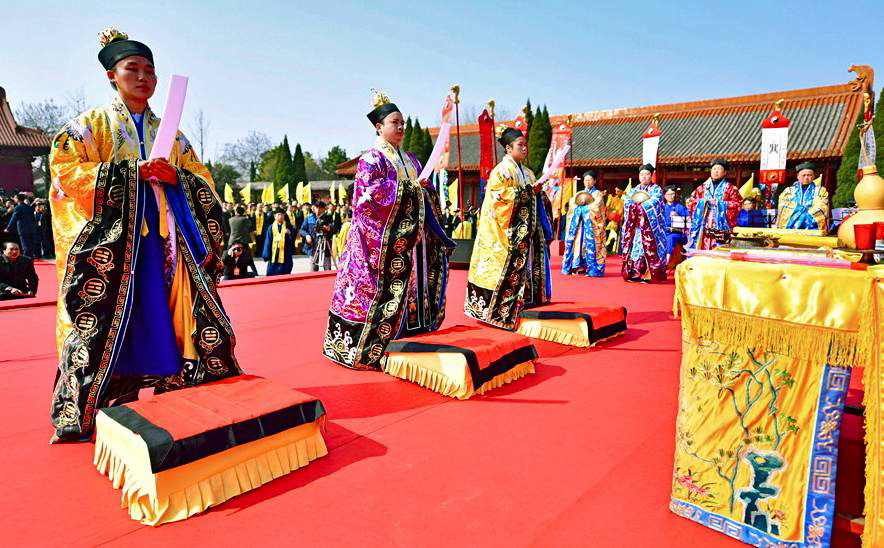 |
|
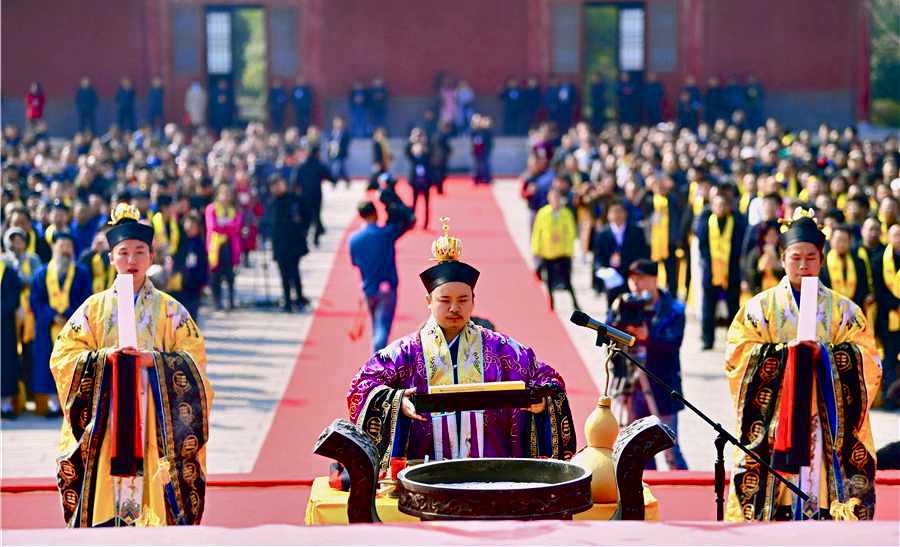 |
|
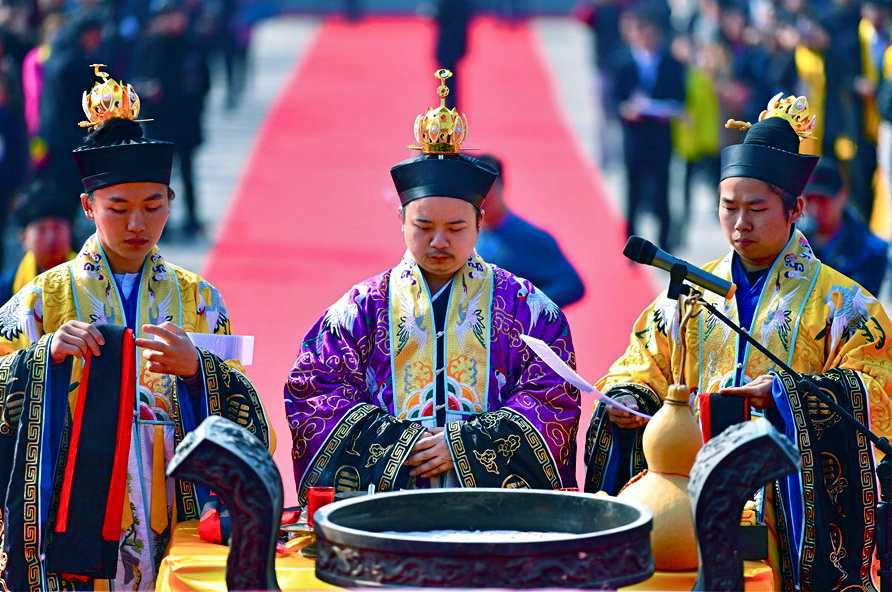 |
|
 |
|
Lao Tze (BC 571-471) is the founder of Taoism and the author of the
Tao Te Ching, which details topics ranging from political advice to
practical wisdom.
Teachers at the academy will use the Tao Te Ching, the universal Taoist
text book written by Lao Tze more than 2,000 years ago, as the main
teaching material, said Zhou Fan, president of Guangdong Langdun Group,
investor of the project.
The academy, to be built in the Greater Toronto Area, will help further
spread the Chinese culture and allow the world to understand China in a
better way, Zhou told a press conference on Tuesday.
"We will pump 200 million yuan (32.02 million U.S. dollars) in building
the academy as well as a Lao Tze Garden there, which will cover an area
of 455 mu (0.3 square km)," Zhou said. |
|
Jiangxi Hosted the 3rd International Taoist Forum |
China hosted the Third International Taoist Forum in Yingtan, Jiangxi province, to push forward Taoist learning
and practice, the country's Taoist association announced.
The forum, held on Nov 25th & 26th,
2014 at Longhu Mountain,
was attended by close to 180 Taoist experts and
practitioners from more than 20 countries. The forum had the theme of practicing Taosim and
setting up moral role models, benefiting the people and
society, and included meetings on topics ranging from health
through environmental protection.
The forum helped
display the unique charm of Taoism and further promote the
Chinese traditional culture.
It also helped increase the impact of Chinese Taoism
worldwide and enhance international exchanges on the
subject.
The forum used new media, including micro blogs and
websites, to better connect with the audience. It also had
three televised forums.
Hu Youtao, vice-governor of Jiangxi province and director of
the organizing committee of the forum in Jiangxi province,
said it was held in accordance with standards of
international forums and observed official frugality rules.
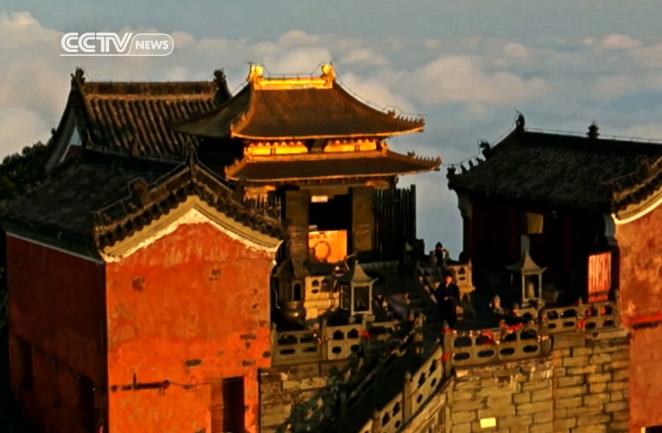
The Tao of Health:
International Forum Focuses on Health and Longevity
Health and longevity have been the focus of
the 3rd International Taoist Forum in Southeast China’s
Jiangxi Province. In Taoist theory, to concentrate on
individual development is to practice the path of the return
to the Tao on a macro level to be in harmony with nature.
CCTV’s Han Bin interviewed Taoist masters to seek the
answers of healthy living.
Taoism is connected with achieving
well-being. Traditionally, those practices were reserved for
followers, acquiring an aura of mystery.
“To cultivate health, you need to learn the true meaning of
life. Only by understanding life, can we pursue the
cultivation of longevity, the importance of health,” said
Taoist master Zhu Heting.
“Health needs a healthy mind first, by minimizing your
desires and centering ourselves on stillness. Human lives
are in our control,” said Taoist master Li Zhiwang.
Taoism believes in the value of life. Taoists do not focus
on life after death, but rather emphasize practical methods
of cultivating health to achieve longevity. The forum only
gives a glimpse of their health philosophy to determine our
lies through the many meanings of Tao.
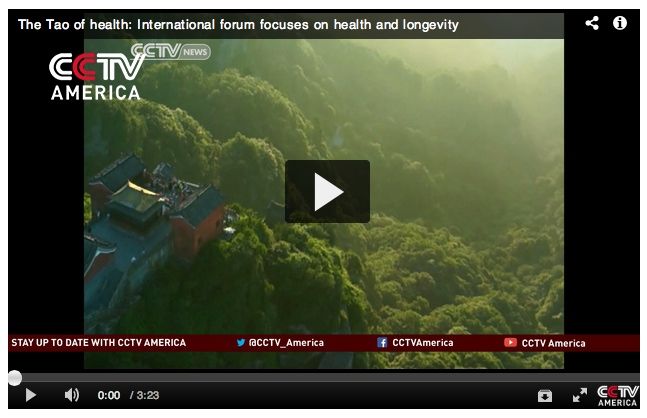
The First and Second
Taoist Forums were Held
Xi'an and Hong Kong, in 2007
Nanyue, Hunan Province, in 2011
|
|
|
 |
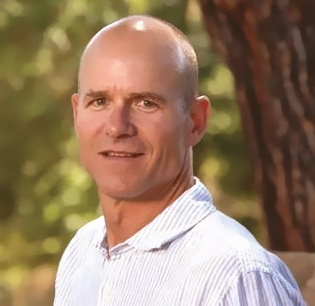 |
|
The prodigious "Norton Anthology of
World Religions"
Taoism is listed as one of the six major living World Religions
With Christianity, Islam, Judaism, Hinduism, and Buddhism |
|
Taoism is a Chinese belief tradition known to most
people in the West through the slim book “The Scripture of the Way
and Its Virtue”
(Tao Te Ching or, more correctly pronounced “Daode Jing”).
Attributed to a Sage in the 6th century BC named Laozi (often
spelled Lao Tzu). |
|
The “Daode Jing” has been called the most widely
translated book after the Bible
It teaches an enigmatic philosophy of living in harmony with nature and
achieving a kind of effortless success in life
by following the Dao, or the “Way” |
|
Taoist sensibility has infused pop culture, from the
Force in “Star Wars” to the best-selling “The Tao of Pooh.” But it’s
just one early work associated with Daoism, a far broader tradition that
includes teachings on celestial deities, alchemy, meditation, bodily
self-cultivation, and monasticism. Western thinkers have historically
focused more on Daoism’s philosophical than its religious side; in China
and other East Asian countries, however, Daoist ceremonies and rituals
are still important, though they were suppressed to some extent by the
Chinese Communist Party.
James Robson, a scholar of East Asian religions at Harvard, was tapped
to edit the Daoism section of the new Norton anthology, which meant
collecting a set of readings to define a tradition that has been notably
hard to pin down. He was able to draw on a recent resurgence of interest
among scholars who are translating and studying the surprisingly vast
Daoist religious canon, much of which had been lost and then
rediscovered in the 20th century.
Some might expect that a Harvard professor would enforce a purist
version of historical Daoism, but Robson took quite the opposite
approach. It includes religious texts, and also embraces writings by
Westerners intrigued by Daoist thought, including Carl Jung, Oscar
Wilde, and RZA, leader of the hip-hop group Wu-Tang Clan.
Robson spoke in an interview from his office at
Harvard
IDEAS: Why should Daoism be considered a major living
religion?
ROBSON: I think most general readers would assume that Daoism and most
religion had died in China after the Cultural Revolution, because it had
been critiqued and dismantled and attacked. But in fact, what we find is
that it survived, and there’s been an incredible resurgence of the
tradition in China, and that it never actually went anywhere despite all
that it suffered. |
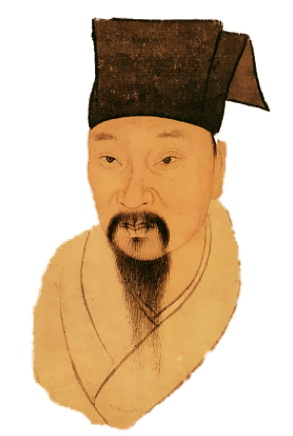 |
IDEAS: What did it suffer?
ROBSON: The persecutions of religion go all the way back to the late
19th century....China had gone through tumultuous times historically,
was perceived to be weak in relation to other parts of the world, and
had seen the success of science developing in other places, and
therefore anything that was religious or superstitious was considered to
keep China behind....They basically started to transform Daoist schools
and temples, and they dismantled the religious institutions, defrocked
the priests.
IDEAS: What about Daoism as a religion now?
ROBSON: Daoism has always knit together communities; it’s always been
the glue that’s held together local society, and it still does that
today....[In addition], you have this huge influx now of capital coming
back from wealthy overseas Chinese businesses that have led to the
revival and rebuilding of temples in China.IDEAS: Westerners seem to
have a fairly narrow view of Daoism, if they think about it at all.
ROBSON: One of the reasons Daoism was less well known to people around
the world, in comparison to, say, Buddhism and Hinduism in Asia, is that
the scholarship on Daoism is very new. It really only began in earnest
around the 1950s. There are two reasons. One is ideological; The
religious forms of Daoism were always perceived to be something less
than its philosophy....The other one is something more particular, that
the main body of Daoist texts, something like 60 major volumes that
constitute the Daoist canon, had gone almost completely out of
existence. There were one or two surviving copies in China, and those
were only rediscovered and printed in 1926.
IDEAS: In addition to these religious texts, you include an excerpt
from “The Wu-Tang Manual” and “The Tao of Physics,” among other
surprises.
ROBSON: It’s a world religion, in the sense that it spread to Korea,
Japan, to peninsular Malaysia, and then to Europe, the US, and
elsewhere. |
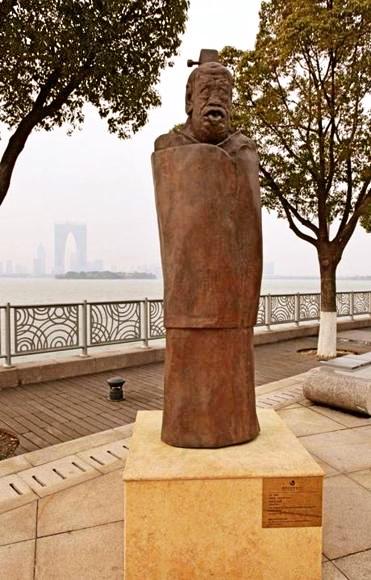 |
| I’ve tried to track that with a few key examples. I include a fair
amount of material on the Jesuits, who were the first ones to really
export knowledge of Daoism during the 17th and 18th centuries. But then
why stop there? So I include Alfred, Lord Tennyson...and Oscar Wilde,
who read a review of a translation of a Daoist text and was excited
about it. I include the Beatles, who took one chapter of the “Daode jing”
that was translated and put it to music. And the more recent one is
RZA’s own interaction with Daoism, where he read the “Daode jing” and
was incredibly moved by it, and that became an inspiration for him going
to China and also using the Wu-Tang—it should be pronounced “Wudang,”
because it’s the name of a Daoist sacred mountain that he took for their
band name. IDEAS: But doesn’t that risk just becoming a collection of
misinterpretations by outsiders? Where do you draw the line?
ROBSON: I don’t think there is one authentic Daoism; Daoism is many
different things to many different people over time, and what I tried to
do is explore the range of what that name has been applied to.
IDEAS: It’s fascinating that the “Daode jing” is so widely translated,
but you point out that many “translations” are by people who don’t even
read Chinese.
ROBSON: The “Daode jing” is a strange text in many ways....Everybody
thinks that Daoism has this transcultural nature to it that you can tap
into, and that if you read different English or French translations of
it, you can discern the meaning behind the text and write an “inspired
version.”...The occultist Aleister Crowley in the early 1900s did a very
bizarre thing where he retreated to this island in the middle of the
Hudson River, and then had a celestial vision where deities came down to
him and spoke the “Daode jing” to him...and that was his translation. He
basically said that Jewish Kabbalists gave him the key to understanding
the meaning of the “Daode jing.” And then Timothy Leary did [a]
“psychedelic translation” of the “Daode jing.”...People have this notion
that they can just sort of be in touch with the text and discern its
deepest meaning.
The irony is that some of those translations have been the best-selling
ones, and some of the most academically rigorous ones have not sold
anything. And the one that I would say is the most philologically
precise is absolutely unreadable. |
|
|